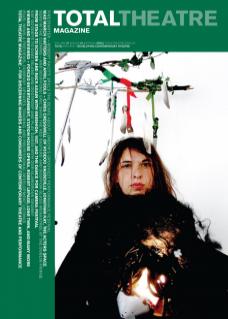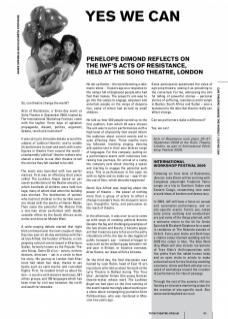So, can theatre change the world?
Acts of Resistance, a three-day event at Soho Theatre in September 2008, hosted by The International Workshop Festival, came with the tagline ‘three days of agitation, propaganda, dissent, politics, argument, debate, revolt and revolution!’
It was set up to stimulate debate around the subject of ‘political theatre’, and to enable UK performers to meet and work with iconic figures in theatre from around the world – unashamedly ‘political’ theatre-makers who shared a desire to use their theatre to tell the stories they felt needed to be told.
The event was launched with two performances. First was an affecting short piece called The Luckless Angel, based on personal recollections of the Beslan atrocity, in which hundreds of children were held hostage, many of whom died when the building was stormed. The testimonies of women who had lost children in this terrible event are mixed with the poetry of Heiner Muller. Then came the powerful The Rivonia Trial, a one-man show performed with deadly comedic effect by the South African actor, writer and director Monde Wani.
A wide-ranging debate started that night that continued over the next couple of days. Day two saw an all-day workshop with Derek Uya Alfred, the founder of Kwoto, a campaigning cultural centre based in Khartoum, Sudan, formerly known as the Popular Theatre Group. Some 20 of us – actors, writers, dancers, directors – sat in a circle to hear his story. His journey to London from Khartoum had taken four days, thanks to setbacks such as sand storms and cancelled flights. First, he needed to tell us about Sudan – a country with massive land mass, 597 ethnic groups, and 100 languages which has been riven by civil war between the north and south for decades.
He set up Kwoto – the word denoting a talismanic stone – 14 years ago as a response to the camps full of displaced people who had fled their homes. The project’s aim was to go into the camps to engage, empower and entertain people on the verge of desperation, some of whom had arrived as small children.
He told us how 400 people turned up to the first audition, from which 45 were chosen. The aim was to put on performances with a high level of physicality that would inform the audience about current events and issues affecting them. Three months training followed, involving singing, dancing and spoken text in their own diverse range of languages. For this company, putting on a performance starts with numerous hair-raising bus journeys. On arrival at a camp, the company sets about clearing a space and starting to engage the potential audience. This is performance in the open air, with no lights and no make-up – apart from the use of flour, which denotes happiness!
Derek Uya Alfred was inspiring about the power of theatre – the power of nothing more than a group of actors to effect a change in people’s lives. An eloquent raconteur; thoughtful, funny, and persuasive on the reach of theatre.
In the afternoon, it was over to us to come up with ways of creating political theatre. Despite the big and challenging examples of the two shows and Kwoto, it became apparent that it was too easy to focus on the petty tribulations of life, the day-to-day niggles of public transport, say – instead of bigger issues such as the widening gap between rich and poor in Britain, or injustice overseas. After Kwoto, our ideas all felt a bit tame.
On the third day, the final discussion was hosted by Leon Rubin, head of East 15 acting school, who told us about his work at the Lyric Theatre in Belfast during ‘The Troubles’. Jennipher Antoni (the young German theatre-maker whose work The Luckless Angel we had seen on the first evening of the event) spoke movingly about working on a show about campaigning journalist Anna Politkovskaya, who was murdered in Moscow two years ago.
Some participants questioned the value of agit-prop theatre, seeing it as preaching to the converted. For me, witnessing the skilful telling of powerful stories – personal stories of suffering, resistance and triumph in Beslan, South Africa and Sudan – was a testament to the idea that theatre really can effect change.
Can we performers make a difference?
Yes, we can!
International Workshop Festival 2009
Following on from Acts of Resistance, director Luke Dixon will be working with Congolese playwright Frederick Yamusangie on a trip to Southern Sudan and Eastern Congo, researching new work around ideas of borders and democracy.
In 2009, IWF will have a focus on sexual and ceremonial performance, and on site-specific events. Tantric sex, naked body prints, waltzing and wonderment are just some of the things planned, with a welcome return to the UK for Annie Sprinkle & Elizabeth Stephens for a week in residence at The Rotunda outside of Oxford. Every year Annie and Beth have a chakra colour-themed wedding and for 2009 the colour is blue. The Blue Wedding Week will also include recreations of Yves Klein’s Anthropometries with live prints from the naked human body, and an open invite to artists to make subverted work for the final day wedding ceremony. Annie and Beth will also run a week of workshops around the creation of performance for rites of passage.
Through the rest of the summer, IWF are hosting an intensive mentoring project in the creation of site-specific work. See www.workshopfestival.co.uk
Acts of Resistance took place 25–27 September 2008 at the Soho Theatre, London, as part of International Workshop Festival 2008.

